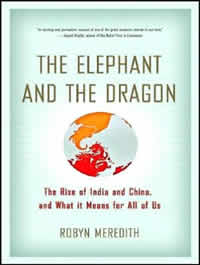Book Notes
 Robyn Meredith, The Elephant and the Dragon; The Rise of India and China and What It Means for All of Us (New York: W.W. Norton, 2007), 252pp.
Robyn Meredith, The Elephant and the Dragon; The Rise of India and China and What It Means for All of Us (New York: W.W. Norton, 2007), 252pp.
A Starbucks at the Great Wall? Stephen Spielberg hired to help with the opening ceremony of the 2008 Olympics in China when a million performers welcome the world? Did India really move from 300,000 cell phones in 1996 to 150 million by 2007, and are they now purchasing seven million "mobiles" a month? Yes, yes, and yes. Welcome to the "tectonic economics" of China and India that have "caused the entire earth's economic and political landscape to shift before our eyes." In this book written for a general readership, Robyn Meredith blends history, economic analysis, numerous anecdotes, and a blizzard of statistics to explain how this happened and what it means.
After twenty-seven ruinous years under Mao that killed 40 million people and decimated not only the economy but science, art, education, and religion, in 1978 Deng Xiaoping took over in China. No, there would not be political freedoms, but yes, there would be radical economic reforms. The results have been startling. Take infrastructure. In 1989 China had a minuscule 168 miles of freeways; by 2010 it will have 40,000 miles. Or exports. By 2004 China was the largest exporter in the world, exporting "in a single day more than it sold abroad during the entire year of 1978." Picture China as the brawny manufacturing giant.
Think of India as the brains of the information and service industries — call answering, computer programming, research and development, data entry, biotech, etc. They have far more workers who are far better educated and who will work for far less at a higher skill level than almost any country. And there's a long and very competitive line in India for these jobs: "When EDS began hiring for its call center in the Mindspace complex, 6,000 people applied for just 110 jobs with a starting salary of $250 a month, or $3,000 a year, for college graduates." No wonder the United States will lose about 3.3 million jobs to "off-shoring" by the year 2010.
But not all that glitters is gold, Meredith points out. While these rising economic tides have lifted hundreds of millions out of poverty, in India, for example, 81% of the population still lives on $2 a day or less. 93% don't graduate from high school. And is it really such a great thing that a billion Chinese consumers are "a tabula rasa for western advertisers?" The economic earthquakes have also caused severe cultural dislocations of gender roles, mass migrations of illiterate peasants to the cities in search of higher-paying jobs, income stratification that is increasing the gap between rich and poor, intellectual property theft, horrendous environmental degradation, and unsustainable consumption of natural resources like iron ore and oil. But this is a one way street and there's no turning back, not for India, not for China, and not for the shell-shocked United States. Stay tuned, and in the mean time you might want to upgrade your job skills.


